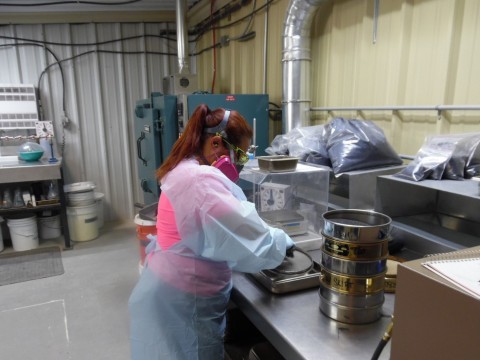A day in the life of a Metallurgical Technician involves conducting tests that are key to monitoring current projects and understanding the feasibility and effectiveness of mine processes.
“Our Metallurgical Technicians produce the daily metallurgical reports. The daily reports are critical to achieve production targets. The test work the Met Lab has produced has been used to support operational optimization of the leach pads and the mill,” said Stuart Myrhow, Metallurgical Manager, Round Mountain.
The metallurgical technicians test activated carbon – made from burnt, crushed, and sized coconut shells – used in the heap leach process to adsorb the gold from the solution. This carbon is contained in tanks in the Adsorption – Desorption – Regeneration (ADR) plants. Over time and through handling, some of the carbon breaks down into smaller particles called carbon fines. If these fines escape from the ADR plant and return to the heap with the solution, they will adsorb gold that can’t be recovered. Screens separate these fines into bags.
Carbon fines testing is key to maximizing recovery and minimizing waste on site. The technicians test the carbon to determine whether it should be stripped and reused, or if it should be sent to a third party to recover the precious metals it contains. Hand augers, metal tools with a small bucket, allow the techs to bore a hole into the carbon and remove a representative core sample from each bag. The technicians test the samples for size distribution and parts per million (ppm) of silver and gold using a XRF (x-ray fluorescence spectrometer) test.

A metallurgical technician, Shawna Pennington, tests the size distribution of a carbon sample
If the samples meet predetermined size requirements, that bag is reused in the plant. If the carbon is not usable for the ADR, then the mine ships it to the smelter. The XRF test provides an estimate of the precious metals in each bag, so Round Mountain knows the value of the bag before the smelter processes and buys the metals.

Metallurgical Technician, Stephanie Shafer, operating the XRF to analyze ppm of heavy metals in sample
Sending out the carbon fines allows Round Mountain to maximize the recovery from their carbon in ways they cannot process on site and the fine carbon is disposed of for them.
Additionally, the Metallurgical Department has been running tests of material from the proposed Phase W expansion project. The small-scale Flotation Testing has been key to understanding how the material may act in the mill, as well as estimating the recovery. Similarly, they have been running a test pad of the Phase W material during the past year to determine the feasibility of leaching. Sampling from this pad was recently completed and the techs are preparing to get tails samples shortly.

Crew 1 from left to right: Carl Wright, Jenny Edom, Monicka Harter-Hill, and Aleksei Saladino

Crew 2 from left to right: Shawna Pennington, Novalee Medlock, and Stephanie Shafer



